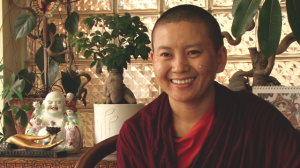The world knows Ani Choying Drolma as ‘the singing nun’. But Ani (honorific for ‘nun’) was at first an accidental nun.
“I did not join the monastery out of any divine calling,” she says with all the nonchalance of an everyday fact. “My father used to abuse me physically and I joined the Nagi Gompa Monastery as it was the next best option to running away.”

“I was the only girl in the family and I was expected to cook, clean and look after my brothers,” she says of her younger days. “My father was a sculptor and a very aggressive man, quite frustrated and at times he would direct his frustrations at me.” The helplessness reached tipping point, she decided not to take it anymore and joined the nunnery. Here she met her guru and guide, the abbot Tulku Urgyen Rinpoche. The Rinpoche and his wife recognised her talent early on and encouraged her to sing.
“My guru started me on the traditional Tibetan Cho chant and I was given the opportunity to sing during ceremonies or and other get-togethers.” Choying Drolma began singing at first to entertain other members and visitors to the monastery.
“I never had any formal training you know, like in sur or taal, but I was taught to sing with lots of bhakti…which comes only with practising humility which my guru was very particular about.” Even if it was a small occasion, she was taught to give everything she got, to give her best. Little did she know that she would be ‘spotted’ during one of these little ceremonies.

“After one of the concert tours, somebody came and gave me a cheque – with my name and the biggest sum I had ever seen written on it. More than being excited, I was amused – I never knew I could make money with my singing. I was always singing because I loved to sing and was always happy to see the peace and happiness it brought to those around me.” From that day began another journey. But this time, it was no accident but something she always wanted to do.
“Even while in school, I was depressed by the preferential treatment given to boys. The girls were always considered inferior – expected to cook, clean and take care of the family. As a 13-year-old, I remember how much energy I had coiled inside me which never found a proper vent. The girls of Nepal – just like in India – are neglected and are subject to suffering for the rest of their lives.”

Her ‘Nun’s Welfare Foundation’ and Arya Tara School were set up as centres for training little girls. Here girls from all walks of life are given free education as well as training in creative pursuits depending on their inclinations. In addition to the foundation, she also runs an orphanage, a destitute home, a biogas centre, a travel service and plans are in the pipeline for a television channel. As diverse as pursuits can be. Where does music figure in all these? I wondered aloud.
“It is music that made all these happen.”





2 Comments
Pragya
Thanks for sharing this amazing story. It makes me proud once more to be a woman! We do indeed have gumption!
Thommen Jose
Her’s is indeed an inspiring story, Pragya. There are so many parallels to a typical Indian story…but here she rises above the abuse, the frustration, the depression. And of course, a benign fate.